Jan 2017
Volunteers protect seal near Water Taxi landing
Jan/26/17 11:12 PM
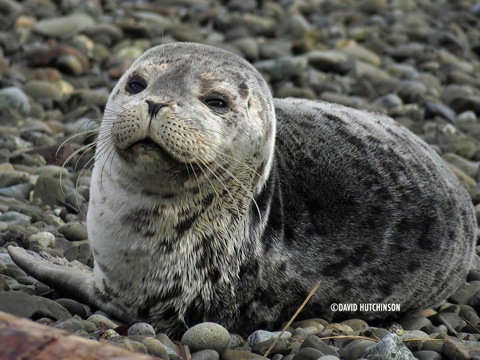
First Responder Robin arrived within minutes and found a sleeping pup on the beach near the sidewalk and about 6 or so feet from the base of the cement steps leading down to the small cove. The pup was at the high tide line, so most likely had hauled out a couple of hours earlier.
After taping off access to the beach, she called Volunteer Scheduler Joslyn who, in turn, began calling vols. John and Helen arrived to lend a hand, followed by Ken, Victoria and Colette. Nanda and super kid volunteers Mathilde and Benny donned blue “NOAA volunteer” vests as well and talked to a steady stream of commuters, walkers, runners and bikers. Later in the afternoon, Lisa and young son Sawyer earnestly chipped in. Sawyer did a serious Seal Sitters marketing campaign to passersby. It was impressive to see Seal Sitters’ youth interact so confidently with the public. First Responders David and Lynn provided additional educational support.
Most of the bitter cold morning, the pup was pretty alert to loud noises from close-up people to passing trucks and busses. After awhile, he seemed reassured to be safe and settled in for some shut-eye. Nicknamed Kimchee by employes of nearby Marination Restaurant, the pup snoozed soundly throughout the afternoon. Marination’s manager Roz generously extended the offer of free hot drinks to frozen volunteers.
After dark, with the Seattle skyline twinkling across the water, Kimchee returned to Elliott Bay. Kimchee has an infected belly wound which was not visible due to positioning until late in the day. Should the pup return to shore tomorrow, a marine mammal veterinarian is available for a consultation, but salt water does have strong healing powers.
Thanks to everyone who helped protect Kimchee on a very cold day. It was great hanging out with people passionate about preserving wildlife and the environment.
Injured seal pup rescued from Lincoln Park beach
Jan/21/17 03:53 PM
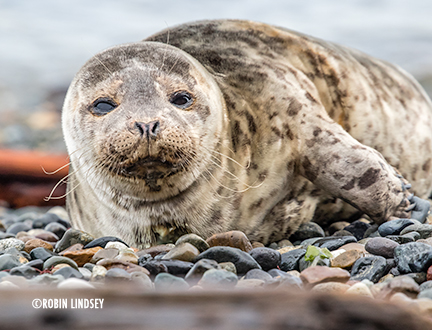
The pup captured this afternoon is the same pup that has been using the shoreline near Lincoln Park’s Colman pool the past couple of days. The pup was first sighted on the pebbled beach early Thursday morning (see post below) and again late yesterday afternoon, just before dark. Both times, the pup returned to the water after resting briefly onshore.
Early this morning, the hotline received a call about a pup hauled out a few yards from Seal Sitters’ permanent signage, posted just north of the public pool. When First Responder Robin arrived, concerned residents, including the reporting party, were standing guard over the alert pup, in the driftwood just feet from the paved pathway. The three women enthusiastically helped stretch tape and signage to provide a safety zone, closing it off to entry and disturbance.
Volunteer scheduler Lynn scrambled to line up volunteers. So many were attending the Women’s March in downtown Seattle today that the online calendar was bare. First Responder Dana came down to lend a hand. Before long, volunteers Jennifer, Elissa, and Buzz arrived to pass out small info handouts and inform passersby that resting out of the water is normal behavior for all seals. Kids were given seal stickers that were promptly stuck on bike helmets and jackets.
Photos taken with a telephoto lens revealed a severely infected wound on the throat of the pup. The images were sent for review to a consulting vet and plans were subsequently put into place to capture the pup and transport for treatment.
First Responder Lynn arrived with capture supplies. Because the pup was positioned so close to the water’s edge and was becoming increasingly alert as time passed, after resting for about 7 hours, the capture was challenging. Volunteers Richard and Brian explained to onlookers the reason for intervening and helped keep the sidewalk area free of a crowd.
The feisty, wriggly pup snapped wildly at Robin and Lynn as they secured him in a net and transferred into a kennel for the drive to PAWS Wildlife Center in Lynnwood. Many a rehabber and responder have been bitten by seals. “Seal finger” is a zoonotic disease that will not heal unless the proper antibiotic is administered quickly.
Seals are wild animals and should be treated respectfully - and carefully - as such. Seals and other marine mammals can transmit a number of serious diseases to humans and dogs. Only members of NOAA’s Marine Mammal Stranding Network are authorized to handle, examine and transport seals.
Seal Sitters will keep you informed as we receive information on the health of this pup, dubbed Wild Thing, after the very spirited capture.
On an encouraging note, seal pup Hope who was rescued last week is doing great at PAWS. She suffered over 20 puncture wounds, most likely inflicted by a dog(s).
PUPDATE 1/22/17
We were able to secure some initial health info from PAWS about the rescued seal pup. Wild Thing, a thin male, thankfully made it through the night, but has a number of concerning issues which are being treated, including infected puncture wounds. We hope to receive a further update tomorrow.
Resting ashore with tides and wind no easy task for seal pup
Jan/19/17 07:10 PM
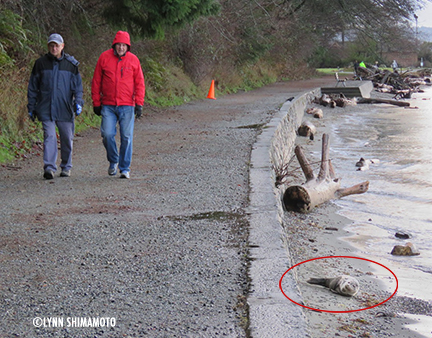
The wriggly pup stayed about an hour before the lapping waves pulled him/her back into Puget Sound. Followed by two more return trips to shore, he kept trying to find a dry perch. But there was just not enough land to manage any rest. Finally, the pup slipped off into the dark gray water and his silvery head was last sighted headed north off Lowman Beach. Lynn checked all public beach access from there to Constellation Park, where waves battered the shore, and saw no sign of the wandering seal pup.
Thanks to Lynn for literally going the extra mile, trying to protect this very tired pup. We are comparing identification photos to see if the pup is in our current response database or is a new visitor.
Seal pup rescued by stranding team is stable at rehab facility
Jan/13/17 05:44 PM
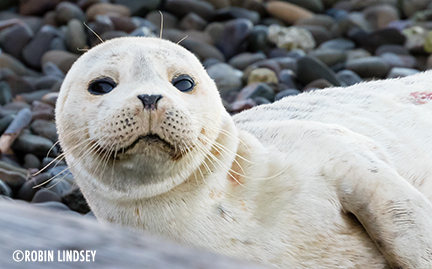
The curious pup, estimated 4-6 months old, watched as Lynn closed off the area, stretching yellow tape between orange cones and sandwich boards, around a picnic table and a prickly “sticker” bush, since the ground was too frozen to pound in stakes. Reluctantly removing her glove in the frigid 24 degree air, she speed dialed the Volunteer Scheduler for the day, Jonel, who began lining up Seal Sitters for what could potentially be another long day on the beach. On Wednesday, this same pup nicknamed Hope, did not return to the water until around 5pm, well after dark.
While John and Lynn kept Hope safe from disturbance, First Responder Robin began the process of lining up a health assessment by a NOAA-authorized consulting veterinarian, a recently implemented program to assist stranding networks with on-the-beach evaluations. Handling and transporting an animal for evaluation causes undue stress, which has its own negative impacts. Examinations are only done when there is sufficient cause or concern.
The day before, volunteers noticed the pup had a number of pale bloody spots on her white coat - perhaps Hope had a serious case flipper lice and had been scratching the areas raw. However, in closer review of photos on a computer that evening, things looked suspicious. There was a possibility these were punctures, though difficult to tell in the roughened fur. The only way to know for sure would be a closer examination and we were lucky that the pup had indeed returned for another day of rest.
After consulting with regional coordinator for NOAA’s Marine Mammal Stranding Network, Kristin Wilkinson, a call was placed to PAWS Wildlife Center to ensure the facility could accept the pup for treatment if necessary. The next call was placed to Dr. Lesanna Lahner, consulting vet and Executive Director of the newly-formed SR3, a non-profit dedicated to marine mammal health.
Early in the afternoon, the team of Seal Sitters responders and SR3’s Dr. Lahner and Casey Mclean discussed the next steps, while observing the sleeping pup. As the team approached, the now awake and feisty pup was captured with a net and examined on the beach. Blood oozed from what was definitely many puncture wounds. It was obvious Hope needed to get treatment. Seal Sitters volunteer Bob offered to make the long drive north and transport Hope to PAWS in Lynnwood. Upon arrival, rehabbers stabilized the pup and cleaned out her wounds.
We were stunned to learn that Hope, a female weighing about 34 lbs, had more than 20 puncture wounds on her small body, believed to be from an unidentified animal(s) - possibly canine, but unable to say with any certainty at this time. Thankfully, the bites were not deep and not yet abscessed.
Hope survived the night, but PAWS staff is cautious about her survival, as there are some bleeding issues not really explained by the superficial wounds. The reason for the bleeding continues to be investigated. She has been given a little pool to help keep her hydrated and active and the wounds moist. Hope is also receiving treatment for parasites, common for all weaned seal pups during winter months, which contributed to her occasional coughing spells on the beach and often leads to serious viral conditions.
Seal Sitters will keep you posted about Hope’s condition and any new information that comes to light regarding the cause of the puncture wounds. Thanks to all of the volunteers who protected the little pup during her stay on the beach and to supporting members of NOAA West Coast MMSN who assisted in her rescue. Heartfelt thanks to PAWS for their kind and expert care of wildlife. We hope for this pup’s recovery and release back to the waters of Puget Sound.
PUPDATE 1/19/17
PAWS Wildlife Rehabilitation Manager, Emily Meredith, reports that seal pup Hope is feisty and doing “pretty well.” She’s eating fish on her own in an outdoor pool and has begun treatment for lungworms. The treatment itself poses health risks for animals and rehabbers remain cautiously optimistic about her recovery.
Resting pup causes concern at Harbor Island shipyard
Jan/10/17 08:03 AM
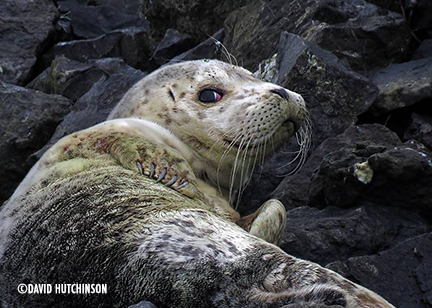
On Monday, we had one of our first responses of 2017. Seal Sitters dedicated hotline (206-905-7325) received a report of a seal onshore at Vigor Shipyards. After passing through security, First Responders David and Eilene were escorted to the seal pup’s location on the rocks below the busy shipbuilding and repair facility, situated at the northwest end of heavily industrial Harbor Island, at the mouth of the Duwamish Waterway.
The seal’s condition and behavior were observed and evaluated, seemingly in fairly typical body condition for a pup this time of winter (a few nicks and abrasions and somewhat thin). It should be noted that while pups can appear to be doing reasonably well, their health can deteriorate rapidly within days. Arrangements were made to notify Seal Sitters’ hotline if the seal did not enter the water within 24 hours or a significant injury was observed.
Never hesitate to contact Seal Sitters MMSN with any concerns about marine mammals on shore, alive or dead. Our trained responders will come to the site to evaluate the situation and determine if a seal pup meets NOAA’s requirements to be considered for rehabilitation. In the event of dead animals, an examination is performed whenever possible and information is entered into NOAA’s national database, monitoring the health of marine mammal populations.
Harbor Island and the Duwamish Waterway are on the eastern edge of Seal Sitters MMSN’s territory. View (and download) a map of NOAA’s Marine Mammal Stranding Networks serving Puget Sound, including territories and contact information, here.







